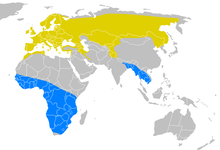Delichon urbica
| Common house martin | |
|---|---|
 |
|
|
Song recorded in Cardiganshire, Wales
|
|
| Scientific classification | |
| Kingdom: | Animalia |
| Phylum: | Chordata |
| Class: | Aves |
| Order: | Passeriformes |
| Family: | Hirundinidae |
| Genus: | Delichon |
| Species: | D. urbicum |
| Binomial name | |
|
Delichon urbicum (Linnaeus, 1758) |
|
 |
|
| Range of D. urbicum Breeding range Wintering range | |
| Synonyms | |
|
Hirundo urbica Linnaeus, 1758, Delichon urbica |
|
Hirundo urbica Linnaeus, 1758, Delichon urbica
The common house martin (Delichon urbicum), sometimes called the northern house martin or, particularly in Europe, just house martin, is a migratory passerine bird of the swallow family which breeds in Europe, north Africa and temperate Asia; and winters in sub-Saharan Africa and tropical Asia. It feeds on insects which are caught in flight, and it migrates to climates where flying insects are plentiful. It has a blue head and upperparts, white rump and pure white underparts, and is found in both open country and near human habitation. It is similar in appearance to the two other martin species of the genus Delichon, which are both endemic to eastern and southern Asia. It has two accepted subspecies.
Both the scientific and colloquial name of the bird are related to its use of human-made structures. It builds a closed cup nest from mud pellets under eaves or similar locations on buildings usually in colonies.
It is hunted by the Eurasian hobby (Falco subbuteo), and like other birds is affected by internal parasites and external fleas and mites, although its large range and population mean that it is not threatened globally.
The common house martin was first described by Linnaeus in his Systema Naturae in 1758 as Hirundo urbica, but was placed in its current genus, Delichon, by Thomas Horsfield and Frederic Moore in 1854.Delichon is an anagram of the Ancient Greek term χελιδών (chelīdōn), meaning "swallow", and the species name urbicum (urbica until 2004, due to a misunderstanding of Latin grammar) means "of the town" in Latin.
...
Wikipedia

